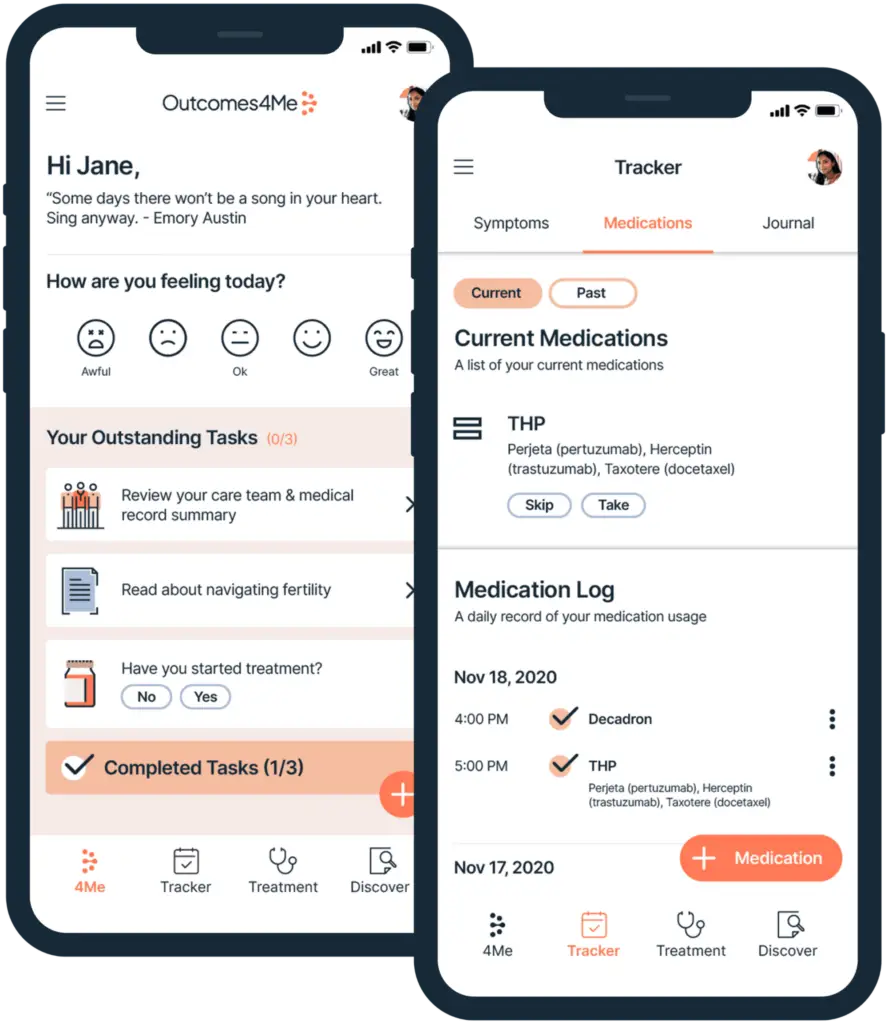Let’s take a closer look at some common genomic testing options—Oncotype DX, MammaPrint, Breast Cancer Index Test, EndoPredict, and Prosigna Breast Cancer Prognostic Gene Signature Assay—to see which option may suit you best.
What are Genomic Tests?
First things first—before we compare different genomic testing options, it can help to understand what genomic tests are. Genomic tests are able to detect how active certain genes are in a cancer tumor by analyzing a sample of the tumor.
What the activity level of the genes in a cancer tumor are like can affect how cancer behaves, grows, and spreads. Doctors use genomic test results to help them determine what treatments are necessary to pursue post-surgery.
Oncotype DX
The Oncotype DX Breast Recurrence Score Test (Oncotype DX) provides a gene analysis for patients with early-stage breast cancer regarding how the cancer is likely to behave and respond to treatment.
This test is used in two different ways:
- To estimate a patient’s risk of early-stage, estrogen-receptor-positive breast cancer coming back in a part of the body that is not the breast (known as distant recurrence)
- To determine if a patient will benefit undergoing chemotherapy
Patients who meet the following qualifications may be eligible for the Oncotype DX test:
- Recently diagnosed with stage I, stage II, or stage IIIa invasive breast cancer
- Cancer is estrogen-receptor-positive
- Cancer is HER2-negative
- Cancer is lymph node-positive or lymph node-negative
- Your doctor is trying to decide whether or not chemotherapy may be beneficial for you
While most early-stage, estrogen-receptor-positive, HER2-negative breast cancers are treated with hormonal therapies, this test can help determine whether or not chemotherapy should also be added to their treatment plan.
The Oncotype DX test analyzes the activity of 21 genes that can influence how likely a cancer is to respond to treatment, grow, and return. Other factors such as the size and grade of the cancer, as well as how many hormone receptors the cancer cells have will also be taken into consideration when determining whether or not the addition of chemotherapy will be beneficial to the patient.
MammaPrint
MammaPrint is a type of genomic testing best suited for early-stage breast cancer patients who are:
- Stage I or stage II
- Invasive
- Smaller than 5 centimeters
- In three or fewer lymph nodes
- Hormone-receptor-positive and hormone-receptor-negative
The MammaPrint test is performed after a biopsy or surgery on a sample of preserved tissue and tests the activity of 70 genes. This test then calculates a recurrence score that indicates how high risk someone is for having their cancer return. These results—alongside other unique patient information—will help your doctor determine whether or not to add chemotherapy to your treatment plan.
Breast Cancer Index Test
The Breast Cancer Index test is designed for patients who meet one or more of the following characteristics:
- Is diagnosed with early-stage (stage I-III) breast cancer
- Cancer is hormone-receptor-positive
- There was no cancer in the lymph nodes or cancer is lymph-node positive and is in one, two, or three lymph nodes
- You have taken hormonal therapy for four to five years (this test can indicate if more hormonal therapy is beneficial)
To conduct the Breast Cancer Index test, preserved tissue removed during surgery or biopsy is analyzed and makes it possible to study the activity of 11 genes. These genes can tell us how likely cancer is to come back five to ten years after diagnosis. One of the main benefits of this test is determining whether or not continuing hormonal therapy for another five years is beneficial. Many breast cancer patients struggle with the side effects of hormonal therapy such as joint pain and hot flashes and may not want to continue with hormonal therapy if it won’t be beneficial to them. It’s important to remember to speak with your doctor before making any changes to your hormonal therapy.
EndoPredict
The EndoPredict test helps predict the risk of distant recurrence of early-stage, hormone-receptor-positive, HER2-negative breast cancer that is either node-negative or has up to three positive lymph nodes.
If you meet any of the following standards, you may be eligible for the EndoPredict test:
- Recently diagnosed with stage I or II estrogen-receptor-positive, HER2-negative breast cancer
- There is no cancer in the lymph nodes (node-negative disease) or there is cancer in one to three lymph nodes
- You are in the process of making decisions about chemotherapy options after surgery with your doctor
The way the EndoPredict test works is that it analyzes the activity of 12 different genes in breast cancer cells that are linked to the likelihood of recurrence in an area away from the breast with 10 years of diagnosis. This test can also identify the size of the cancer and whether or not it is in the lymph nodes.
Of course, your doctor will use other factors aside from these test results to determine the best treatment course, but the EndoPredict test can help make a more informed decision about chemotherapy.
Prosigna Breast Cancer Prognostic Gene Signature Assay
Formerly known as the PAM50 test, the Prosigna Breast Cancer Prognostic Gene Signature Assay (Prosigna assay) can help predict the risk of distant recurrence specifically for postmenopausal women within 10 years of diagnosis of early-stage, hormone-receptor-positive disease with up to three positive lymph nodes after 5 years of hormonal therapy.
To qualify for the Prosigna assay, you must meet the following qualifications:
- Be a postmenopausal woman
- Be stage I or stage II and lymph node-negative or stage II with one to three positive lymph nodes
- Be hormone-receptor-positive
- Be invasive
- Been treated with surgery and hormonal therapy
Similar to other genomic tests, the Prosigna assay is performed on preserved tissue removed during the original biopsy or surgery.
The Prosigna assay examines the activity of 50 genese (known as the PAM50 gene signature) and your doctor will take these results as well as factors like size of the cancer and cancer grade into consideration when determining what treatment path to pursue.
The Takeaway
Which genomic test will best help you determine recurrence odds and the best treatment plan depends on your unique diagnosis. Your doctor and care team will help you determine which test best suits your needs and how to use those test results to create the best possible treatment plan for you.
Login to Outcomes4Me today and provide access to your medical records so our clinical team can help you decide which genetic test might be right for you!




